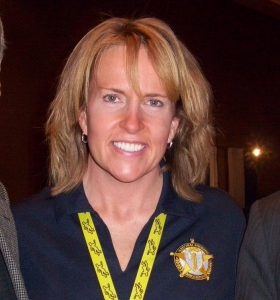By Leischen Stelter, editor of In Public Safety
Career paths are rarely straight. Kelli Callahan certainly didn’t anticipate she would be celebrating 25 years in law enforcement when she took a full-time job at a sheriff’s department as a college student. As an undergraduate, she pursued a degree in biology with a minor in chemistry with the intention of becoming a marine biologist.
However, her career path shifted when the sheriff’s department expanded its evidence analysis unit. Since she had a hard sciences background, administrators asked if she would be interested in joining the newly formed forensics division. Initially, she turned them down — marine biology was her intended path. But the more she learned about this burgeoning science, the more intrigued she became. She started dabbling in fingerprint classification and latent print analysis and quickly got hooked.
[Related: Interested in a Career in Criminal Forensics: Perspectives from the Field]
“Forensics is so incredibly dynamic and it changes constantly, which is why it’s maintained my interest for so many years,” she said. “It’s a field that is never stagnant, it’s constantly evolving.”
However, it’s important for those interested in forensics not to confuse dynamic with exciting.
“Forensic science is actually quite boring to the layperson,” she said. “I joke with my students that if there was an actual reality-based television program about forensics that showed the laborious, meticulous nature of the profession, no one would watch. Real forensic scientists spend a lot of time on paperwork, waiting for lab reports and verifying results, passing evidence along to others for analysis — it’s nothing like you see on TV shows.”
[Related: Careers in Forensics: Investigating Death]

That’s why those interested in forensic science must have a passion and personal vested interest in science. “You absolutely have to love science,” she emphasized. She is constantly telling students that they must “always exercise critical thinking skills and question everything. That is the foundational component of being a scientist – never take anything for granted and question everything.”
She also reminds students that they can never stop learning about forensics. “Just because it’s cutting-edge technology today, tomorrow it could be antiquated,” she said. Forensic science remains a relatively new field so the science and technology are constantly evolving. It is no small feat to stay up to date with changes. “I tell my students that maintaining proficiency in this field is a part-time job. I want them to know they can never sit back – this profession is evolving too quickly and it’s too dynamic.”
[Related: Forensics Expand Beyond DNA to Bacteria]
Callahan continues exploring her passion for forensics in new and challenging ways. She currently teaches forensic science courses, including fingerprint analysis and criminalistics, at American Military University. She also works full-time in a forensic mental health unit at a men’s prison.
Callahan’s career may not have gone in the direction she envisioned as a college student, but she has maintained an ongoing passion for forensics and law enforcement. She wants to share her enthusiasm and excitement with students. “I always wanted to keep challenging myself and trying new areas,” she said. “And I want to impart that enthusiasm and respect for the profession on my students.”

Comments are closed.